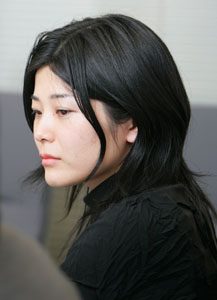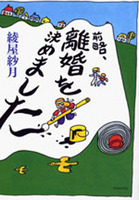【The article below is the same as the article that appears in the twelfth issue of the CGS Newsletter.】
As seen by developments in recent years such as the enactment of the Support for Persons with Developmental Disabilities Law, there is a growing social awareness about developmental disabilities. Nevertheless, stereotypes of the developmentally disabled as being inflexible, stubborn, or incapable of meaningful communication still prevail. Satsuki Ayaya is co-author of Hattatsu shougai toujisha kenkyuu (A Study of Developmental Disabilities based on Personal Experience), which realistically depicts the problems faced by the developmentally disabled from a personal perspective.
Ayaya has also recently published Zenryaku, rikon o kimemashita (Honey I'm Filing for Divorce; 2009), a book about her marital experience as a victim of domestic violence and her road to divorce. Read on and find out how Ayaya survived domestic violence and learned to live with her developmental disability.
(CGS Editor)
■"What on earth is wrong with me?"
"I can't seem to connect with people. I can't feel the joy of being in a group." For as long as I can remember, I have not been able to fit into a group environment. My sense of estrangement increased as the inexplicable fragility of my body and mind prevented me from doing things at the same pace as others. "I can't work outside, but maybe I can work inside the house." Coming to this conclusion after much meandering, I married. Yet, in marriage lay another pitfall.

■On Being Drawn into the Web of Domestic Violence (DV)
After our marriage, my husband's work began taking up more of his time. As his alcohol consumption increased, it became customary for him to say: "I'm important, because I'm working. You're worthless because you stay at home and earn nothing!" My self-esteem was extremely low in those days, partly because I was unable to work or do household chores like other people. So, I was no match for my husband when he looked down on me for being inferior due to my inability to earn a living or my lack of education. I would think, "That can't be right," but I couldn't find the words to express this. I didn't have the knowledge or vocabulary to say, "No, you're wrong!" and I didn't have the physical strength to say, "Fine then, I'll work too and have someone look after the kids!" If I had, this story may have turned out differently. But as it was I had no weapons with which to completely defeat my husband, so he walked all over me and rapidly strengthened his hold on me.
■What is Communication Disorder?
- Asperger Syndrome and DV
Being diagnosed with Asperger Syndrome (AS) was a huge relief for me. I felt as if I had finally discovered the reason for all of the baffling problems that had plagued me from childhood. However, it did not help my marital problems, but, rather, came to be used against me: "Your communication disorder's the reason why our marriage isn't working!" At this, I thought, "What?! Something's gone wrong again... "I had to find out more about both developmental disabilities and DV, in order to separate the two problems from each other. Based on what I learned through this process, I wrote the two books, Hattatsu shougai toujisha kenkyuu (A Study of Developmental Disabilities from Personal Experience) (Igaku-shoin) and Zenryaku, rikon o kimemashita (Honey, I'm Filing for Divorce) (Riron-sha).
In Hattatsu shougai toujisha kenkyuu, I began by declaring that I would not define Asperger Syndrome as a communication disorder. Otherwise, all problems in communication, including DV, would inevitably be attributed to me. Communication is something that occurs between two people, so all communication problems shouldn't be attributed to one person by means of the word, "communication disorder". I strongly disagreed with experts who used the concept in spite of this. It's true that I often find it difficult to fit into a group. But that doesn't mean that I'm not thinking at all, or that I don't have my own logic for my thoughts. I don't think it's fair to be treated as if I don't understand anything. Anyway, the word, "communication disorder" makes me sound like I'm completely broken or out of control, doesn't it? *laughs* It's not like that ? I have my own set of rules and patterns. And I believe that I know much more about these rules than any expert. So Hattatsu shougai toujisha kenkyuu is a collection of things that I felt were different from the analyses of "experts", or things that I thought could be explained differently.
With the recent "Brain Science" boom, some scientists have been saying things like "communication disorder occurs because this bit of the brain is missing." This makes me angry and uncomfortable. I mean, everyone's brain is different, so what can we achieve by blaming it all on the brain? It's like, "So who cares about brains?" *laughs*
■How I Escaped from DV
I first needed to hear stories that would support me, such as those from Feminism or theories on DV. That was the stage when I needed to repel my story of abuse and know that it would be a world that I could look back at. But it was a very long time before I could be certain that I could do this. I wanted to find real information, not just from books, so I finally found a local women's counselor. She had experience with many different cases, and when she told me, "What you are experiencing is called DV," I felt acknowledged for the first time. But to overcome the problem, I needed more. Even though I wanted to break away from DV, I would think, "no matter how abused I am, I know this place better. It might still be safer than a world I don't know at all. Maybe I can still cope somehow..." and be pulled back into my old world. I needed a vision of what comes next ? a story about what would happen if I took specific action. What I needed was hope.
■"Oh, It was actually really bad..."
One of the most difficult parts of the divorce process was not knowing just how much I could put up with in my marriage if I tried. Up until the end, I found it hard to decide on a cue; to know just when it was okay to leave my husband. Supported by the people around me, and observing the reactions of my own children, I ticked off the reasons for staying one by one, until there were no more reasons left. That was when I finally took the plunge. At the same time as my divorce, I ventured into the world of feminism, where I tried talking about the things my husband had said to me, like "If you earn 100,000 yen, I'll give you some human rights" or "If you have a third child, I'll treat you like the Empress Dowager." It would really make people laugh. They would say, "Just who does he think he is?!" and their laughter finally made me realize that my situation had been so bad, it was actually funny. It started to become a routine joke that I would tell because, wherever I told it, people would scream with laughter *laughs*. When my husband had said these things to me, a part of me just couldn't believe it, but there was another part of me that just thought, "Oh, so you can't have human rights if you don't have 100,000 yen." I would be shocked, thinking, "I can't earn 100,000 a month, and he's asking for the impossible when there's no way for me to do such a thing!" So I was repeatedly plunged into total despair.
■ Building Identity as Others Respond to Me
The long road from escaping DV up until my final divorce consisted of repeatedly being bolstered up by people who were on my side, and of being propelled into the next world.
Coming into contact with a world where reactions to my story would be "What? That's terrible!" and being acknowledged by real, live people, I became aware of the wretchedness of my situation, and gradually escaped from DV. I realized that my identity is built as others respond to me. When I was close to giving up, I used to think, "I can just connect with people in books, since I can't connect with them in real life." But that wasn't right. It's not that I can't connect with anyone. I have started to feel that if I can meet people who will respond to me, I can become visible and connect with them. Of course, I haven't resolved all my problems yet, but I've finally come to feel now that my situation is "not too bad."
□Satsuki AYAYA
Ayaya was born in 1974 and has two children. After years of confusion and different diagnoses - hypotension, depression, etc - she finally discovered that she had Asperger Syndrome in 2006. She is the author of Zenryaku, rikon o kimemashita (Rironsha) and co-author of Hattatsu shougai toujisha kenkyuu (Igaku shoin).

